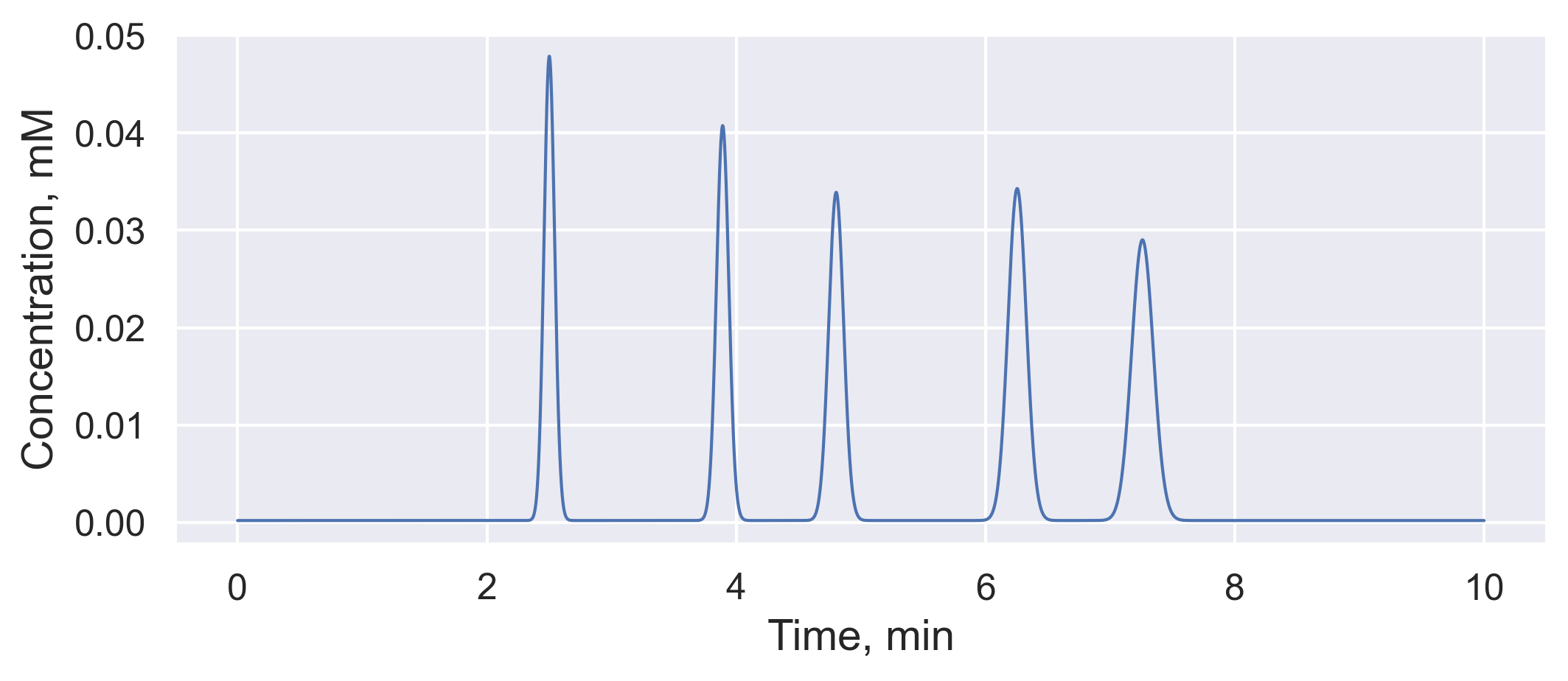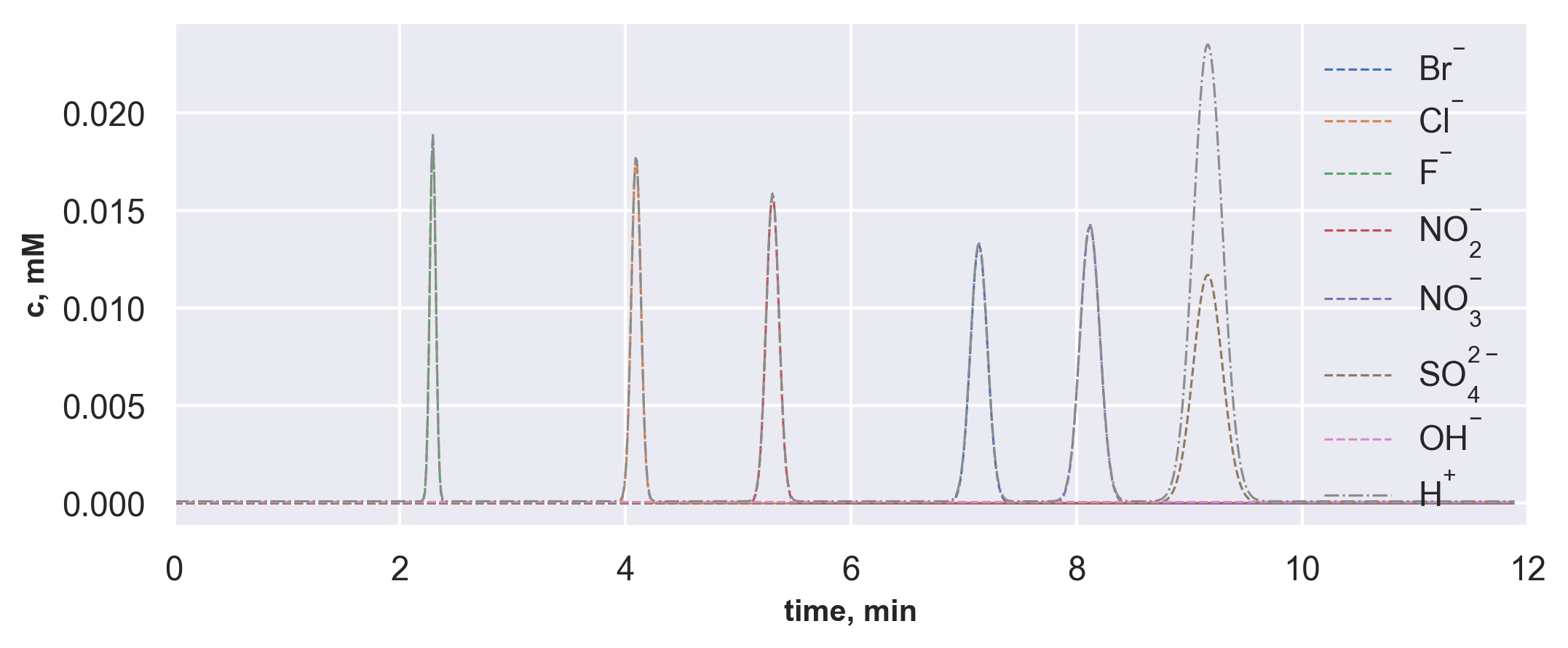A python toolkit for ion chromatography
Project description
PyICLab
PyICLab is an open-source Python package designed for in-silico simulations of ion chromatography (IC).
Features
- Implementations of IC components
- Built-in numerical models
- Flow path management
- Suitable for complex IC setups and conditions
Installation
PyICLab can be installed via PyPI using pip. Ensure you have Python 3.11 or higher.
For Windows:
pip install pyIClab
For MacOS:
pip3 install pyIClab
Note for Apple Silicon Users
PyICLab currently DOES NOT support the ARM64 architecture directly. To use PyICLab on Apple Silicon, you are advised to build your Python3 environment using an x86 version of conda/miniconda.
Dependencies
PyICLab requires the following Python packages:
numpy>=1.26.4scipy>=1.12.0pandas>=2.2.0pint>=0.23matplotlib>=3.8.2seaborn>=0.13.2phreeqpython>=1.5.0pyEQL>=0.12.2beautifulsoup4>=4.12.3tqdm>=4.66.2quadprogdeprecated
Get Started
Here is a simple example to demonstrate the basic usage of PyICLab:
from pyIClab._testing_toolkit import PackedIC
from pyIClab.beadedbag import mpl_custom_rcconfig
import seaborn as sns
import matplotlib.pyplot as plt
ic = PackedIC()
ic.go(tmax='10 min')
detector = ic.detectors.pop()
df = detector.get_signals()
sns.set()
plt.rcParams.update(mpl_custom_rcconfig)
fig, ax = plt.subplots()
ax.plot('time', 'signal', data=df)
ax.set_xlabel('Time, min')
ax.set_ylabel('Concentration, mM')
plt.show()
Or build your IC system step by step
Import the necessary components from the PyICLab package.
from pyIClab import (
IonChromatograph, Eluent, SwitchingValve,
SampleLoop, Dummy, QuickSuppressor, Detector,
)
Create the necessary accessories for a basic IC system. Ensure each accessory has a unique name. This includes:
- An IC pump (Eluent)
- A six-port valve
- A 25-µL sample loop
eluent = Eluent.HydroxideIsocratic('18 mM', fr='1 mL/min') # Name defaults to 'KOH'
valve = SwitchingValve.SixPort() # Name defaults to 'SixPort'
loop = SampleLoop('Loop', V='25 uL')
Use a built-in column initializer with a primitive stationary phase database
column = Dummy.Column() # Name defaults to 'Dummy'
PyICLab provides several suppressor implementations. Here is the simplest one. Visit pyIClab.assemblies.signals for more options. Also, add a detector to the system.
suppressor = QuickSuppressor('Suppressor', kind='anion')
detector = Detector('Detector')
Connect all the accessories and install the IC system. I bet you have done it a lot.
valve.assemble(0, eluent)
valve.assemble(1, column)
valve.assemble([2, 5], loop)
column.assemble(suppressor)
suppressor.assemble(detector)
Now we can build a basic IC system. Setting lockon=valve means that when accessing the IC system, PyICLab will find all the accessories by starting with the valve. All accessories traced back to the valve will be included in the IC system.
ic = IonChromatograph('SimpleIC', competing_ions=('OH-',), lockon=valve)
Prepare a simple solution and inject it into the loop.
solution = {
'F-': '0.05 mM',
'Cl-': '0.075 mM',
'NO2-': '0.09 mM',
'Br-': '0.1 mM',
'NO3-': '0.125 mM',
'SO4-2': '0.15 mM',
}
ic.inject(solution, 'Loop')
Set a model constructor for the sole column in the IC system. PyICLab provides built-in model constructors that allow you to configure model parameters in one code line. Use help(pyIClab.interface.DSMConstrutorForColumns) for more information.
ic.set_ModelConstructor('DSM_SEConstrutor', 'Dummy')
Set commands for the IC system as if it were real. You can also use .add_command() to add commands one by one.
commands = '''
0.0 min, sixport, inject
0.5 min, sixport, load
'''
ic.reset_commands(commands)
Think we are all set. Let's go.
ic.go('12 min')
Use the .plot method to show the effluent composition.
detector.plot()
Project details
Release history Release notifications | RSS feed
Download files
Download the file for your platform. If you're not sure which to choose, learn more about installing packages.
Source Distribution
Built Distribution
File details
Details for the file pyiclab-2024.6.6.1.tar.gz.
File metadata
- Download URL: pyiclab-2024.6.6.1.tar.gz
- Upload date:
- Size: 104.0 kB
- Tags: Source
- Uploaded using Trusted Publishing? No
- Uploaded via: twine/5.0.0 CPython/3.11.9
File hashes
| Algorithm | Hash digest | |
|---|---|---|
| SHA256 | 66be821a8900ca43e864031d05e28c7a58fb5bbfc76fe3eeac2903a35da20d3a |
|
| MD5 | 916c85dc522608198f1ded20a6df3aea |
|
| BLAKE2b-256 | 6b54863d5fd5a152812c634582ace2c3e1de0a4ee3b869cc117c2426885dfea4 |
File details
Details for the file pyIClab-2024.6.6.1-py3-none-any.whl.
File metadata
- Download URL: pyIClab-2024.6.6.1-py3-none-any.whl
- Upload date:
- Size: 111.9 kB
- Tags: Python 3
- Uploaded using Trusted Publishing? No
- Uploaded via: twine/5.0.0 CPython/3.11.9
File hashes
| Algorithm | Hash digest | |
|---|---|---|
| SHA256 | 00657b9c3220dbab4795c1f9f6c2472ea1c8b4fcfcc47aa2e9617d4d6e14b2fc |
|
| MD5 | 276dac13c9c29f7100a317974f4b3df7 |
|
| BLAKE2b-256 | 299b6f7cdb678ba47ffbfe029c805dc12a6cec80cfccf50b584c80ee453d9b3a |















